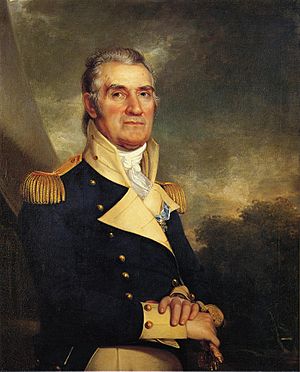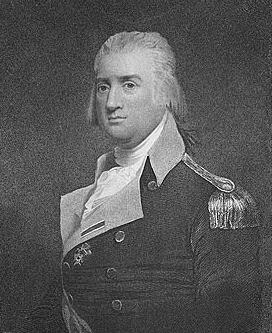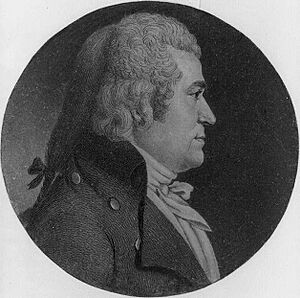Samuel Smith (Maryland politician) facts for kids
Quick facts for kids
Samuel Smith
|
|
|---|---|
 |
|
| Mayor of Baltimore | |
| In office 1835–1838 |
|
| Preceded by | Jesse Hunt |
| Succeeded by | Sheppard C. Leakin |
| President pro tempore of the United States Senate | |
| In office May 15, 1828 – December 11, 1831 |
|
| Preceded by | Nathaniel Macon |
| Succeeded by | Littleton W. Tazewell |
| In office December 2, 1805 – November 6, 1808 |
|
| Preceded by | Joseph Anderson |
| Succeeded by | Stephen R. Bradley |
| United States Senator from Maryland |
|
| In office December 17, 1822 – March 3, 1833 |
|
| Preceded by | William Pinkney |
| Succeeded by | Joseph Kent |
| In office March 4, 1803 – March 4, 1815 |
|
| Preceded by | John E. Howard |
| Succeeded by | Robert G. Harper |
| Member of the U.S. House of Representatives from Maryland's 5th district |
|
| In office January 31, 1816 – December 17, 1822 |
|
| Preceded by | Nicholas Ruxton Moore |
| Succeeded by | Isaac McKim |
| In office March 4, 1793 – March 3, 1803 |
|
| Preceded by | William Vans Murray |
| Succeeded by | Nicholas Ruxton Moore |
| Member of the Maryland House of Delegates | |
| In office 1790–1792 |
|
| Personal details | |
| Born | July 27, 1752 Carlisle, Province of Pennsylvania, British America |
| Died | April 22, 1839 (aged 86) Baltimore, Maryland, U.S. |
| Political party | Democratic-Republican, Jacksonian |
| Spouse | Margaret Smith |
| Profession | |
| Signature |  |
| Military service | |
| Allegiance | |
| Branch/service | |
| Rank | Major General |
| Battles/wars | American Revolutionary War Whiskey Rebellion War of 1812 |
Samuel Smith (July 27, 1752 – April 22, 1839) was an important American leader. He served as a Senator and Representative for Maryland. He also became the mayor of Baltimore, Maryland. Smith was a brave general in the Maryland militia. He was the brother of Robert Smith, who served as a cabinet secretary.
Smith held the role of President pro tempore of the United States Senate twice. This means he led the Senate when the Vice President was not there. His first term was from 1805 to 1808. His second term was from 1828 to 1831.
Contents
Samuel Smith's Early Life and Military Service
Growing Up in Pennsylvania and Maryland
Samuel Smith was born in Carlisle, which was then part of the Province of Pennsylvania. His family later moved to Baltimore, Maryland in 1759. He went to a private school. After school, he worked in trade and shipping.
Fighting in the Revolutionary War
When the American Revolutionary War began, Smith joined the army. He quickly rose through the ranks. He served as a captain, major, and lieutenant colonel in the Continental Army. Early in the war, he was sent to arrest Governor Eden in Annapolis.
In September, 1777, Smith led 200 soldiers to defend Fort Mifflin. This fort was on the Delaware River. The British army was trying to capture Philadelphia. Smith's troops had to take a long route to reach the fort. They were helped by boats from the Pennsylvania Navy. The British attacked the fort for weeks. Eventually, the American forces had to leave it. After the war, Smith continued his work in the shipping business.
Joining the Society of the Cincinnati
In 1783, Smith became a founding member of The Society of the Cincinnati of Maryland. This group was for officers who fought in the Revolutionary War. He later became the vice president of the Maryland Society. From 1828 until his death, he served as its president.
Leading the Maryland Militia
From 1790 to 1792, Smith was a member of the Maryland House of Delegates. This was a state-level political role. In 1794, he was made a brigadier general in the Maryland militia. He led Maryland's soldiers during the Whiskey Rebellion. This was a protest against a tax on whiskey.
Samuel Smith's Political Career
Serving in the U.S. Congress
Smith began his national political career in 1793. He was elected to the Third United States Congress. He served as a Representative until 1803. As a Congressman, he chaired the U.S. House Committee on Commerce and Manufactures.
In the important 1800 United States presidential election, Smith played a key role. He helped negotiate the winning votes for Thomas Jefferson. This happened in the United States House of Representatives.
Becoming a U.S. Senator
In 1802, Smith was elected to the United States Senate. He was a member of the Democratic-Republican Party. He served as a Senator from 1803 to 1815. During this time, he was also President pro tempore of the Senate twice.
Defending Baltimore in the War of 1812
During the War of 1812, Smith was a major general in the Maryland militia. He led the defense of Baltimore in September 1814. His careful planning helped the Americans win the Battle of Baltimore. This victory was very important.
Returning to the House and Senate
Smith was elected to the House of Representatives again in 1816. He filled a vacant seat. He served in the House until 1822. During this time, he worked on committees like the Committee on Ways and Means.
In 1822, Smith resigned from the House. He was then elected back to the United States Senate. He served as a Senator until 1833. He again served as President Pro Tempore of the Senate. He also chaired the Committee on Finance.
Mayor of Baltimore and Retirement
Two years later, in 1835, Samuel Smith became the mayor of Baltimore. He served as mayor until 1838. After this, he retired from public life. Samuel Smith passed away in Baltimore in 1839. He is buried in the Old Westminster Burying Ground.
Samuel Smith's Views on Slavery
In 1828, Samuel Smith was the Vice-President of the Maryland State Colonization Society. This group was part of the American Colonization Society. These organizations worked to help Black Americans move to African states like Liberia. The goal was for them to live free lives there.
 | Janet Taylor Pickett |
 | Synthia Saint James |
 | Howardena Pindell |
 | Faith Ringgold |



